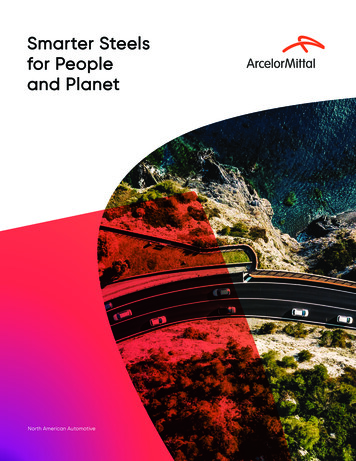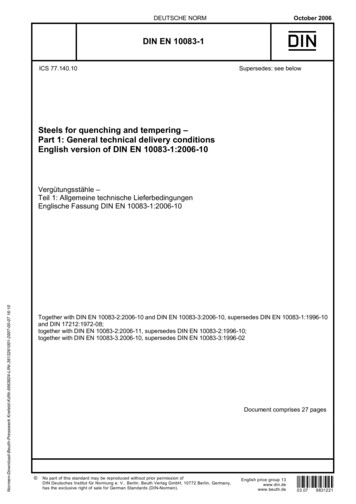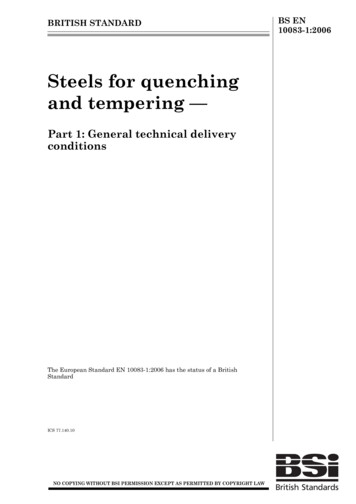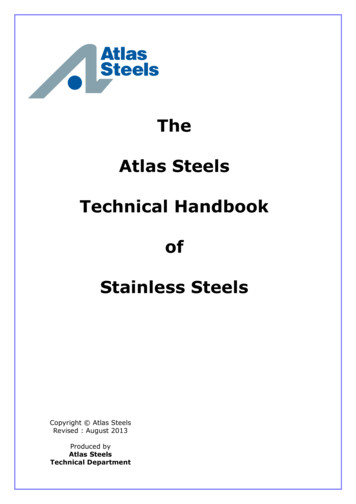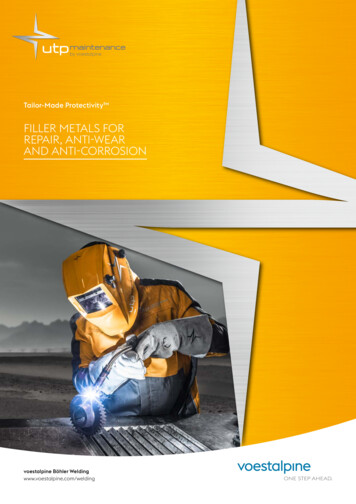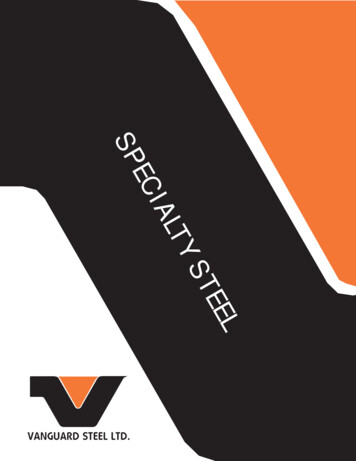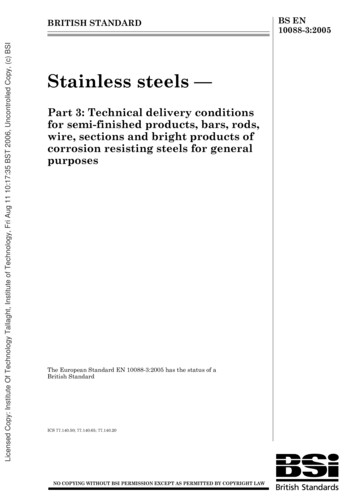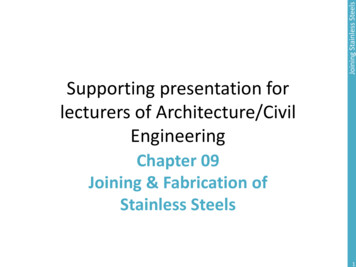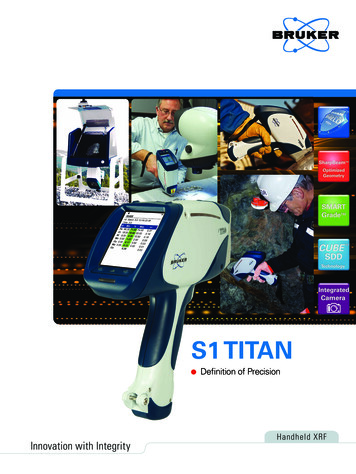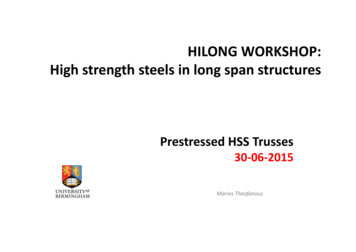
Transcription
HILONG WORKSHOP:High strength steels in long span structuresPrestressed HSS Trusses30‐06‐2015Marios Theofanous
HILONG WORKSHOPBirmingham research team: Dr Marios Theofanousm.theofanous@bham.ac.uk Michaela Gkantou (Research Fellow)m.gkantou@bham.ac.uk Professor Lambis 015
HILONG WORKSHOPPRESENTATION OUTLINE1. Introduction2. Prestressed steel structures3. Prestressed members Experiments Numerical modelling4. Prestressed trusses Experiments Numerical modelling Dynamic response5. Conclusions30‐06‐2015
HILONG WORKSHOP30‐06‐20151. Introduction HSS have increased fy compared to ordinary structural steels Young’s modulus remains the same, hence stiffness rather than strength ismore likely to govern the design of HSS slender structures Deflections (SLS) and buckling become increasingly important As part of the HILONG project, means to mitigate excessive deflections havebeen investigated
HILONG WORKSHOP30‐06‐20151. Introduction Long span applications (stadia, arenas) considered less stringent deflections limits structure deadweight is a considerableproportion of the design load aesthetics is an important design criterion Steel cables are introduced into the chords of tubularsteel trusses and post‐tensioned to provide a moreefficient load carrying mechanism Particularly efficient for light, long span structures Post‐tensioning used to erect the structure,minimising or even eliminating the need for craneageleading to safe and rapid constructionHSS long span structure: Friends ArenaStadium, Sweden
HILONG WORKSHOP30‐06‐20151. Introduction Research on prestressed arched trusses dates back to '90s, when the University of Sydneystarted a research campaign on the response of prestressed arched trusses with slidingjoints that can be erected through the tensioning of a cable on their bottom chord. The cable tensioning allows the predetermined gaps on the bottom chord to close, thuscreating the upward curvature of the top chord. The trusses are unloaded during their assembly, whereas after the erection, the tensioningforces of the cable induce compressive forces at the bottom chord, which after theapplication of external vertical loading is subjected to tensile stresses. The top chord is subjected to negative bending during the uplift of the truss Technology developed and implemented S‐Squared (project partner) Clarke, M.J. and Hancock, G.J. (1991) Finite‐element nonlinear analysis of stressed‐arch frames. Journal of Structural Engineering, 117:2819–2837 Clarke, M.J. and Hancock, G.J. (1995) Tests and nonlinear analyses of small‐scale stressed‐arch frames. Journal of structuralengineering, 121: 187–200
HILONG WORKSHOP2. Prestressed Steel StructuresCase studies designed by S‐squared Long span applications (stadia, arenas) considered Aviation Sport Industrial Military Government Councils Mining Residential developments HumanitarianAdvantages of S‐squared technology Use less carbon Save time right through the project life cycle Improve construction safety Increase overall strength and structural performance Lengths up to 150 m without intermediate supports 2015
HILONG WORKSHOP30‐06‐20152. Prestressed Steel StructuresCase study 1: Ilshin textile factory (industrial building) Location: Changshu, Jiangsu Province, China Size: 80m clear span x 88m Ilshin Textile Co. Ltd recognised the long term value and flexibility of a completely column free productionspace. S‐squared innovative approach to modifying and improving an existing structural system typically usedthroughout China delivered this, while reducing material requirements by around 40% http://www.s‐squared.com.au/hopxme.asc
HILONG WORKSHOP30‐06‐20152. Prestressed Steel StructuresCase study 2: Central west livestock exchange Location: Forbes, NSW Size: 84m clear span x 116m The innovative, post‐tensioned steel roof solution for the CWLE at Forbes, NSW incorporates clear spans of 84metres over a site of approximately 9,700 m2 with clear heights of 5.5m rising to 14m in the centre of thebuilding. Such large spans are unprecedented in livestock facilities and agriculture in general, where traditional saw‐toothdesigns with a forest of internal columns are commonly used. http://www.s‐squared.com.au/hopxme.asc
HILONG WORKSHOP2. Prestressed Steel StructuresCase study 3: Sydney olympic stadium reconfiguration Location: Homebush, NSW Size: Twin 114m clear span North and South roofsections, 7000m2 total covered area The lightweight, post‐tensioned truss and infill roofsystem was assembled outside the stadium seatingbowl and lifted into position with cranes. TheStadium remained fully operational duringconstruction, with no internal propping from thestands or field required, thus preserving all availableseats and ticket revenue throughout the busyfootball season (NRL, AFL and ARU). The S‐squared solution delivered a high degree ofsustainability with steel weight reductions of 40%,and was subject to rigorous scrutiny frominternational architects and engineers includingPopulous (then HOK Sport), Sinclair Knight Merz(incorporating Modus) and Arup. 2015
HILONG WORKSHOP30‐06‐20152. Prestressed Steel StructuresCase study 4 : Australian equine & livestock events centre Location: Tamworth, NSW Size: 22,000m2 S‐Squared were responsible for the design, engineering and construction methodology for the main arena(60m clear span), the stud selling area (42m span dome structure) and six stable buildings (25m span each).Each main element represented different sets of challenges, which were overcome through innovation and acreative approach to form and function. Equine and livestock events are worth more than 45 million annually in the Tamworth region. Since openingin late 2008, over 120 separate organisations have shown interest in using the new centre and it remains fullybooked virtually all year round. http://www.s‐squared.com.au/hopxme.asc
HILONG WORKSHOP30‐06‐20152. Prestressed Steel StructuresArched prestressed trusses in Hyde Park, London
HILONG WORKSHOP30‐06‐20152. Prestressed Steel StructuresP
HILONG WORKSHOP30‐06‐20152. Prestressed Steel Structures Means to increase stiffness The geometry of the arch follows the thrust line of an inverted chain Pre‐stressed cables in the bottom chord: Controls deflections Counteracts self‐weight Enhances the lateral stability of arched trusses in the case of uplift Results in less material usage and more efficient design Tensile forces arise in bottom chord members due to gravity and snow loads Elastic region in tension can be up to doubled since the pre‐compression in the steel tube must first beovercome
HILONG WORKSHOP30‐06‐20152. Prestressed Steel StructuresDefinition of Popt Prestress levelPopt is the optimal prestress level, for which both the tube and the cable yieldsimultaneously under tensile loading and can be calculated by the following formula:, where A is the cross‐sectional area, E is the Young’s modulus, fy is the yield stress and thesubscripts t and c stand for tube and cable respectively
HILONG WORKSHOP30‐06‐2015S690S690S460S4603. Prestressed Steel Members ‐ ExperimentsL essionCompressionCompressionPrestress oYesYesYesNoNoYesYesYes
HILONG WORKSHOP3. Prestressed Steel Members ‐ Experiments30‐06‐2015
HILONG WORKSHOP3. Prestressed Steel Members ‐ ExperimentsAddition of collars for the reduction of buckling length during prestress Gosaye, J., Gardner, L., Wadee, M.A., et al. (2014) Tensile performance of prestressed steel elements. EngineeringStructures, 79: 234–24330‐06‐2015
HILONG WORKSHOP3. Prestressed Steel Members ‐ ExperimentsTensile members30‐06‐2015
HILONG WORKSHOP3. Prestressed Steel Members ‐ ExperimentsCompressive members30‐06‐2015
HILONG WORKSHOP30‐06‐20153. Prestressed Steel Members ‐ ExperimentsGeneral Comments for tensile members Adding the cable increases the capacity of the member Increasing the prestress extends the elastic range leading to stiffer response (bydelaying the yielding of the tube) Strain hardening of the tube ‐ higher ultimate load Failure mode: breaking of the individual cable strands followed by tube fracture Grout delayed fracture of the cable and led to more ductile response as all strandsfractured simultaneously
HILONG WORKSHOP30‐06‐20153. Prestressed Steel Members – Numerical ModellingModelling assumptions Half section & full length modelled Shell elements for the tube and solid elements for the cable and the collars Pin‐ended BC modelled Model included contact Prestress ‐ introduced as initial stresses in the cable Geometric imperfections ‐ introduced through 1st buckling mode ‐ only in the tube Nonlinear static analysis (general static ‐ displacement control) for both compression andtensionRigid Body constraintBC: u1 u2 u3 φ2 φ3 01st buckling modeRigid Body constraintBC: u1 u2 φ2 φ3 0
HILONG WORKSHOP30‐06‐2015WP4, Sub‐Task 4.2.4: FEA of post‐tensioned HSS trusses – Modelling of post‐tensioned members300250Load (kN)20015010050Contact Stresses0050100150Mid displacement (mm)200250Compressive post‐tensioned member with Popt prestress
HILONG WORKSHOP30‐06‐20154. Prestressed Steel Trusses‐ Experiments4 trusses (S460) will be tested: SHS 50 50 5 for bottom chord, SHS 70 70 6.3 for top chord and SHS 40 40 2.9 for diagonal members Truss 1: No cableTruss 2: Cable with nominal pre‐stress level (5 kN)Truss 3: Cable with pre‐stress ½ PoptTruss 4: Cable with pre‐stress Popt
HILONG WORKSHOP4. Prestressed Steel Trusses‐ Experiments30‐06‐2015
HILONG WORKSHOP4. Prestressed Steel Trusses‐ Experiments30‐06‐2015
HILONG WORKSHOP30‐06‐20154. Prestressed Steel Trusses‐ Numerical ModellingModelling assumptions Truss elements for the cable, beam elements for the tubular members Prestress introduced as initial stresses in the cable Study of both 2D and 3D models Various loading arrangements consideredTruss modelling Geometric imperfections ‐ introduced through 1st buckling mode –only in the tubeInvestigated parameters Prestress level (no prestress, 0.5Popt, Popt) Steel grade Truss shape Cross section of membersAim: Determine the truss geometry that maximises the benefit of prestress
HILONG WORKSHOP30‐06‐20154. Prestressed Steel Trusses‐ Numerical ModellingPrestress level from zero to Popt prestress level
HILONG WORKSHOP30‐06‐20154. Prestressed Steel Trusses‐ Numerical ModellingVarying top chord (80x80x8, 70x70x6, 50x50x5) – bottom chord 50x50x5
HILONG WORKSHOP30‐06‐20154. Prestressed Steel Trusses‐ Numerical ModellingCombination of shell and beam elements
HILONG WORKSHOP30‐06‐20154. Prestressed Steel Trusses‐ Dynamic responseTruss was made to undergo free vibration by applying animpulse at various locations (Locations 1‐11)The time‐accelerationresponse wastransformed intofrequency‐acceleration profileusing the Fast FourierTransform functionThe time‐acceleration response of the trusswas recorded using an accelerometer atvarious locations (Locations 1‐11 )
HILONG WORKSHOP30‐06‐20154. Prestressed Steel Trusses‐ Dynamic response For most structures the introduction of theprestressed cable leads to a negligibleincrease in both mass and stiffness The dynamic response of the prestressedstructure is not significantly affectedno cableno prestress0.5PoptPoptmode 1mode 2Frequency (Hz)17.00817.54317.58517.626Frequency (Hz)47.38545.91545.91045.903
HILONG WORKSHOP30‐06‐20155. ConclusionsPractical issues during prestressing and design The general practical issues of post‐tensioning concrete are applicable to prestressedsteel structures The addition of grouting in prestressed members is advisable, as it not only protects thecable from corrosion, but also ‐as shown for tensile members‐ it delays the fracture ofthe cable, resulting in a more ductile response The addition of collars in the cable is essential at the prestressing stage, as it reducesthe buckling length of the tubular member, which undergoes compression duringprestress Prestress losses (instantaneous losses: losses due to anchorage set, prestressingmethod, friction and elastic shortening, time‐dependent losses: Relaxation of theprestressing steel causes) should be carefully considered
HILONG WORKSHOP30‐06‐20155. ConclusionsPractical issues during prestressing and design Based on the dimensions and type of the selected cable, it should beensured that the there is sufficient space for the groutingTypes of prestressing steel Wires (single unit made of steel) Strands (a few wires are spun together in a hellical form: 2‐wire, 3‐wire, 7‐wire) Tendon (a group of strands or wires are wound to form a prestressingtendon) Cable ( a group of tendons form a prestressing cable)
HILONG WORKSHOP30‐06‐20155. Conclusions Adding the cable increases the member resistance even when no prestress isapplied Increasing the prestress extends the elastic range, leading to a stiffer response bydelaying the yielding of the tube The stiffness is maximized when the cable and the bottom chord yieldsimultaneously (Popt) The influence of prestressing on the dynamic response of the trusses was shownto be negligible
HILONG WORKSHOP30‐06‐20155. Conclusions The main benefit of the prestress is that it increases the truss resistance, whilstdecreasing the corresponding displacement The benefit increases with increasing prestress level (from zero to Popt prestress) The benefit of the prestress changes with the truss shape and the cross‐sectionalsize of the members By delaying the onset of buckling of the top chord the benefit of the prestressincreases
HILONG WORKSHOPThank you for your attention!30‐06‐2015
Marios Theofanous Prestressed HSS Trusses 30‐06‐2015 HILONG WORKSHOP: High strength steels in long span structures. Birmingham research team: Dr Marios Theofanous m.theofanous@bham.ac.uk
